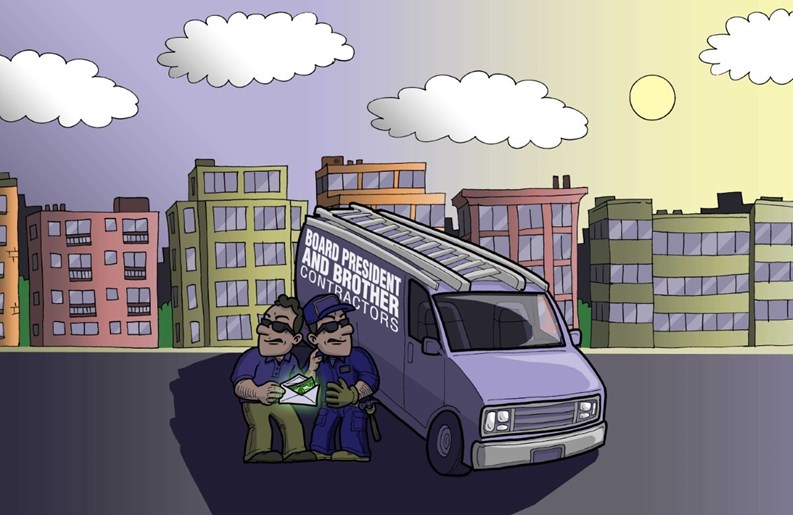The sitting president of a Connecticut condo board recently approached the property manager with a proposition: If he saw to it that her contractor boyfriend was awarded certain jobs in the building, the property manager would receive a tidy kickback. Ken Kohnle, working with Elite Property Management, LLC, based in Farmington, Connecticut, ended the relationship with that building. He said it was the “most shocking” of ethical breaches he’d seen in 22 years of business.
The incident merely illustrates a particularly glaring example of the kind of ethical breaches board members need to watch out for—a task that's not always as easy as it might seem. Although the great majority of board members are honest folks who genuinely want to do what’s best for their communities, many have questions about the boundaries, ethics, and procedures that their job entails, and precious few communities actually have a concrete code of ethics that spells out the “dos and don’ts” for board members.
Kohnle said his company has an unwritten rule: “You do things the right way.” But what is the “right way?” And how does one publicize or teach “the right way?”
Ethics Means Morals?
Before discussing how this all applies to condo boards, it may help to clarify basic terms. “Ethics” are not necessarily synonymous with “morals.” Morals generally intersect with religion or upbringing, whereas ethics prescribe behavior in professional settings. A code of ethics is not a legal document. It’s a code of conduct, self-imposed and self-monitored.
Someone once said that, “Ethics are what you practice when no one is around.” Additionally, what is technically legal may not in fact be ethical. For example, it’s not illegal for a contractor to give a case of wine to a board member who decides how contracts in his or her building are awarded, but it is unethical.
Doctors, attorneys, social workers, journalists and some corporations have written codes of ethics, usually dealing with things like conflict of interest, confidentiality, and in the case of doctors, the Hippocratic Oath, which includes the injunction to “First, do no harm.”
By contrast, co-ops and condos—despite having much in common with corporations and governments—have been slow to write their own codes, even though having them on record can simplify thorny decision-making by spelling out guidelines before a crisis occurs, and once codified, ethical tenets become part of the building's community culture. They can include things that aren't necessarily included in the building's bylaws, but are nonetheless rules that the board wants to adopt in order to have smoother operations, avoid unnecessary litigation, and promote understanding. When executed and enforced correctly, a code of conduct can increase owners' or shareholders' confidence in their board.
Stop and Think
HOAleader.com applies a rationale to written codes. Elizabeth White, a shareholder and head of the community associations practice team at the law firm of LeClairRyan in Williamsburg, Virginia, writes in the online site: “For a lot of board members, when they vote to approve a code of conduct, it makes them stop and think. But it also gives the rest of the board something to point to, when a board member starts straying outside the appropriate lane.
“It gives them something objective to evaluate behavior against. It also prevents board members from saying, ‘I didn’t know accepting a Christmas gift from my landscaper, who also happens to be the association’s landscaper, wasn’t proper.’ ”
It's also important to remember what codes of ethics are not, says David J. Byrne, an attorney shareholder in the law firm of Stark & Stark, based in Lawrenceville. Since they're not legally-binding governing documents, they aren't always supported in every instance by a building's bylaws. “These are typically board-created attempts to regulate their own conduct and adherence to their fiduciary duty,” he says, “but the problem you sometimes run into is when a board member refuses to comply. Is he or she then automatically removed from the board? Bylaws typically don't provide circumstances by which a member can be removed. And they don't typically say that a board member...should be removed if they fail to comply with a board-adopted code of ethics.”
So if that's the case, what powers does a code of ethics really convey to board members to police themselves? “I often hear from boards who say, ‘We have this resolution, or this code of ethics that says our board members are not supposed to talk about what we discussed privately with the owner,’ ” says Byrne. “That's all well and good, but the guy did it anyway. Now they want to kick him off the board, but the bylaws don't allow for that. These board-created ethics codes or resolutions don't automatically create a mechanism where if they're violated, the violator is off the board. So I think boards sometimes assume that they have greater control over the actions or inactions of themselves than they probably really do.”
Eric Goidel, a senior partner with the Manhattan-based law firm of Borah, Goldstein, Altschuler, Nahins & Goidel, PC, agrees, adding that “A code of ethics is probably only best served by what's called 'moral suasion,' where board members sign on to a certain set of policies with the expectation that their fellow board members will adhere to those policies as well. So if they are going to expect their fellow board members to adhere, they better tow the mark themselves.”
“It's somewhat difficult to punish a board member who violates a code of ethics,” Goidel continues. "Obviously, one of the ways is when it's reelection time, other board members who have dealt with a non-cooperating member for the past year just don't campaign for that re-election of that individual. And maybe a decision is made that proxies, which may be delivered to board members aren't cast for a person who has violated the policies. You might also make known to your fellow shareholders and unit owners that you have a rogue board member—though that's a little more difficult because it becomes very contentious in the building and may be unnerving to other residents to perceive a potentially divisive board. “In some cases,” says Goidel, “a board may have the power to remove an officer’s position. So if a president, vice president, secretary or treasurer isn't towing the mark, the board may be able take away that position and just make them a director or board member at large. In the most extreme cases when there has been an egregious violation, you may be able to seek the removal of the board member by a recall vote. Typically, that can only be done by vote of the shareholders and at a special meeting called for that purpose. And most boards don't go that route. They'll tolerate it for the balance of the year, then let the chips fall where they may at the next election.”
Drawing it Up
So say your board would like to develop and implement a code of ethics for themselves and future building administrators to uphold. How does one go about it, and what should one know beforehand?
According to Byrne, a code of ethics “is typically not added to any existing governing document. It's typically done through a board vote. You see general limitations on board powers in bylaws or master deeds or declarations, but you don't see really detailed nuances of things that might be contained within the code of ethics—like 'No board members shall call the property manager after 10 o'clock at night,' for example. Or 'No board member shall contact the property manager on a weekend, except in the event of an emergency, and only if the board president agrees.' That's not in the governing documents that were created by the developer back when the building was started.”
However, the professionals caution against simply adopting a boilerplate document hook, line and sinker. The content and intent of any code should be reviewed carefully, because different HOAs have different needs. Legal professionals recommend going over the generic form as a board project, and discussing the various aspects to see which ones work for your particular community. As one attorney puts it, “I wouldn't just adopt something wholesale without reviewing it carefully and making sure that it works for your building and your set of circumstances.”
Of course, there are two sides to every issue, and when it comes to codes of ethics for co-op and condo boards, there are those who feel that between building bylaws and state law, boards and their business are forced to run a pretty tight ship as it is.
“Unless [a code of ethics] is ratified by 66 and 2/3 percent of the building, it's useless,” says Manhattan-based attorney Adam Leitman Bailey. “And you can't go to court and say, 'Your Honor, the board members or the unit owners agreed to sign this code of ethics... please penalize them or cause them to pay damages.' It doesn't happen. Now, very simply if something appears to be inappropriate or it appears that someone's doing something that may be wrong, that's when you ask around. You speak to your attorney, you talk to the board. You may have to bring it up and basically follow your moral compass. A board can self-impose [a code] upon themselves, if they vote on it. But there's no remedy in court.”
According to J. David Ramsey, a partner in the Real Estate department with Greenbaum Rowe Smith & Davis LLP based in Iselin, “It's far better for a board to have an understanding of what constitutes ethical and unethical behavior before a concern arises, but while the law already provides that a board member owes his or her full faith and loyalty to the association, many board members don't know that or appreciate the breadth of that requirement.”
And even attorneys who support the adoption of codes of ethics agree that unless a code is backed up by a building's bylaws, enforcing it can be extremely difficult. For example, consider a situation in which a board member violates the confidentiality provision of their building's code of ethics. In order to address that breach with residents, board members may have to disclose what the leaked confidence was, snaring themselves in a catch-22.
For a code of ethics to really have teeth, legal pros recommend having a companion bylaw amendment that gives the board the right to remove a director if he or she breaches the bylaws, the code of ethics as adopted, or the house rules. Having that broad language in a companion amendment to the bylaws can give the board the right to remove a board member who is not operating up to the board's agreed-upon standard.
Formal – Not Fussy
According to the professionals, along with corresponding bylaw amendments, a formal, written code, phrased in straightforward terms and including relevant issues and likely scenarios for an individual building community is most effective. While it may be useful to use a pre-made template for the sake of formatting and as a starting framework, a boilerplate document larded with corporate-speak and not addressing community-specific issues is not likely to be taken seriously.
“Different boards will choose different levels depending on particular concerns,” says Ramsey. “At a minimum, a code of ethics deals with a board member's financial or personal interest in a matter and how that impacts his or her ability to participate in board matters. But it can also be much broader and include issues such as the duty to not disclose confidential information to a third party, the duty to treat both board members and owners with respect, a board member's ability to represent him or herself as a member of the board to another public or private body, or it may deal with the right of board members to speak with members of the media.”
All this is not to say that boards should drop everything and call a special session to hammer out a code of ethics for their building. While some boards feel a code is a helpful guide, most buildings don't have them—and according to skeptics like Bailey, they do just fine.
“We have a code of ethics,” he says. “It's called state law. There's been cases for 100 years in every subject you can think of, and it does a great job of covering them. There are always going to be bad people who do bad things, but most [HOAs] are following the rules. The best thing people can do is put on a moral compass and just do what's right. The acknowledgment of trying to do the right thing will cause the co-ops [or] condos to do a much better job of self-governance.” n
Susan Phillips Plese is a freelance writer and a frequent contributor to New England Condominium magazine, a Yale Robbins’ publication. Additional reporting by The New Jersey Cooperator’s David Chiu.







Leave a Comment